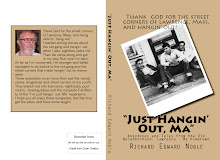Fortress America
By William Greider
Book Review
By Richard Edward Noble

Fortress America was published in 1998. At the time of the publishing of this book the Berlin Wall was gone and the U.S.S.R. had collapsed. With the disappearance of Russia as Public Enemy number one for the U.S., America was now in a quandary. The Cold War was over. What do we do about our massive military? Our Cold War enemy was gone. The Russian threat to our security was gone. Should we dismantle our military? Reorganize? Downsize? How do we do it?
Fortress America is a book that analyzed the problem in store for the U.S. in downsizing its military capacities.
I’m sure it was not Mr. Greider’s intention to present an apology on the impossibility of downsizing our military and the necessity for America to seek new enemies and unnecessary but available wars but this book, in my opinion, is the explanation for just such a scenario.
Mr. Greider in his thought provoking manner, his exhaustive research and his presentation of the facts and figures, makes our present state of affairs obvious.
“If the world is at peace, why should America now have to remobilize? There are no persuasive answers at present.
“To justify the significant budget increases that might rescue the military from its dilemma of competing obligations, political leaders will first have to find convincing dangers – a rising threat of actual war, and on a very large scale. Until they can do so, military leaders must keep hacking away at their own institution … People in the armed services know this…
“The political base that always supported the Cold War defense structure endures, too, without a strategy for the future except to change as little as possible from the past.”
Mr. Greider goes on to talk about our “Military Socialism” and our basic socialized Military Industrial Complex. He then explains the scope of this book.
“In short, our tour of Fortress America is about more than defense spending “in an era of general peace.” It’s about national vision and the “limits of empire,” about whether Americans really wish to govern the world with U.S. military power …
“This is a new world order that will require much more than the accumulation of weaponry, and it might even be subverted by a new global arms race.”
Now let me point out, I haven’t left the introduction to this book yet. We have yet to hit page one.
The book begins with a tour of the massive weapons storage facilities at Fort Hood, Texas: Bradley fighting vehicles, Dragon missiles, M-1 Abrams main battle tanks, Humvees, HEMTTs, HETS, and more than two hundred Apache and Kiowa helicopters. There are forty-eight separate equipment yards at Fort Hood – miles and miles of parking spaces with multimillion dollar units in every parking space.
“The Cold War is over, but not really, not yet … Too many tanks with nowhere to send them ... Defense spending, as one strategic analyst put it, has become ‘the new third rail of American politics.’ Most politicians are afraid to touch it.”
Then we come to the panic of peace.
“The Pentagon has been dumping old tanks like an army-navy surplus store conducting frantic ‘going out of business’ sales. Giving them away to friendly nations. Selling them at deep discounts. Offering them free to local museums. It dumped one hundred old Sherman M-60s into Mobile Bay off the Alabama coast to form artificial reefs for fish in the Gulf of Mexico. Several hundred more are being sunk along other coastlines for the same purpose. One year it gave forty-five tanks free to Bosnia and another fifty to Jordan. It shipped ninety-one tanks to Brazil under a no cost, five year lease, and thirty to Bahrain on the same terms. Another 160 were sold to Taiwan for $130,000 each, priced at ten cents on the dollar. Egypt got seven hundred free by picking up transportation costs … One way or another the Army has disposed of nearly six thousand older (1980 models) tanks during the last six years.”
To actually train men on all our fancy fighting equipment is too costly “It takes two thousand dollars an hour to operate a single M-12 tank in the field.” Instead we pay to build simulators. We have 25 million in video games sitting in one of our military video arcades.
Well, why don’t we mothball everything and then pull it out when we need it?
Unfortunately we can’t mothball very much in our new high-tech military. The electronics deteriorate; the crews take years to train, not weeks; things must be upgraded to stay on top or ahead of the competition. And in many cases we seem to be our own competition. Our independent “capitalist” arms merchants are selling to the highest bidder in the free market global arms race. Of course, we get dibs on the latest, most modern stuff – as long as we subsidize our arms manufactures with their storage costs, their labor costs and their research and development costs – cost plus contracts are nice too. And the fact that all American National arms merchants are basically one big interlocking network, doesn’t hurt the bottom line either.
The first time I read about this technique of selling to potential enemies was in The Arms of Krupp by William Manchester. When Adolf Hitler demanded the German arms manufacturer, Krupp, to stop selling arms to Germany’s enemies, Krupp threatened to take his whole operation, his knowledge and expertise, to Russia. Hitler and Mr. Krupp made a compromise. Krupp agreed to sell only last year’s models to Germany’s enemies. Hitler acquiesced.
They tried to dismantle Krupp industries after the war but found the task impossible. They denied Krupp the right to practice his craft in Germany. Krupp went to China and then to other international sites and became the richest man alive in his day – a great life for a man who should have been executed as a war criminal.
“After the Cold War ended, the government added 2,662 Tomahawks and other missiles to its arsenal. It increased air power capabilities by modernizing 961 night-capable aircraft and 707 precision-guided munitions-capable aircraft.
“The Air Force has so many long range bombers – the old reliable B-52, the troubled B-1, the new stealthy B-2 that costs 2 billion apiece – that it cannot afford to keep them all in the air. Yet, if you can believe its plans, the Air Force intends to increase the operational bomber force 25 percent by 2001.”
But there is always hope Mr. Greider explains: “After all there is always the dim hope that somehow the circumstances will change. Maybe North Korea will invade South Korea. Maybe China will turn belligerent. The (our) nation’s political and military leaders seem to be searching forlornly for a “they” that can restore purpose to the country’s mighty armaments.”
If the reader hasn’t got the point yet, Mr. Greider takes us to a few more military bases and arms storage facilities. The costs are monumental.
Mr. Greider then takes us for a brief look at the investment side of Arms merchandising.
“A decade ago, fifteen leading contractors accounted for two-thirds of the Pentagon’s spending on weapons. By 1995 the list was down to eight. Now, (1998) there are three ...
“The companies can’t keep boosting stock prices by doing more takeovers since there’s nothing much to take over ...
“The point people miss,” Gansler (an analyst) says, “is not that the defense companies are making huge profits. It’s that they’re charging huge costs to government to pay for all of this excess capacity that they’ve got lying around. The government pays for all that. The problem is, if a company becomes a sole-source contractor and there is no competition, then they have no incentive to reduce costs.”
Now it is onto the Global marketplace.
“We’re serious about being a global company, and that means expanding our workforce outside the United States,” says Lockheed Martin.
“LockMartin itself combines seventeen different companies that have collectively eliminated more than one hundred thousand jobs ...
“The American motive for expanding NATO is selling weapons ... American arms producers are loaning new NATO countries the money to buy their weapons and then moving their factories to these countries.”
Now you know why Poland was upset with President Obama and the new Obama European defense strategy. We were rapidly approaching the boom days of the “Merchants of Death” back in the pre-World War I era – sell weapons to anybody, lie, cheat, steal but sell, sell, sell.
“Provoking inadvertent crisis may be profitable for weapons firms, but it does not seem to be in the national interest – or for that matter the world’s”
I suggest that you all read “Merchants of Death” by Engelbrecht and Hanighen. You may have to hunt your library for it, but it will be worth your effort if your goal is to understand the present times. You can also read about the life and times of Sir Basil Zaharoff.
But what is coming in the future? Can we bend the Iron Triangle (Pentagon, military, government). Can we design a meaner leaner military? Can we cut, lower costs, contain, or redesign our mammoth military complex?
“Even if futuristic ideas prove to be sound, the pentagon and the arms industry are still reluctant to give up what already exists – their vast arsenal of conventional overkill. They cannot have it both ways, one would think, but so far they are doing their best to accomplish just that, with very little resistance from the political system.”
In his conclusion Mr. Greider says that first the American people must “say no to empire.”
“The global economic system, led by the United States, governs trade, financial markets, and the rights of capital by imposing complex rules but insists that fundamental human freedoms are not a legitimate basis for global regulation. Raising questions of environmental protection, labor rights, or social equity – not to mention the democratic principles of free speech and freedom of assembly – is described as an intrusion on the trading system, possibly even an impediment to the spread of prosperity. National sovereignty (including America’s) is told to yield to the efficiencies of the global enterprise.”
Mr. Greider goes on and on with one good suggestion after another on transitioning from a militarist nation to a less militarist nation, but that is now all behind us and this book falls into the category of wasted effort.
In retrospect we see that Mr. Greider had it right in his introduction. Finding new wars to fight and devising a new Cold War was easier and much less demanding than attempting to restructure the Iron Triangle and bring America back to a peace loving, cooperative nation.
So if you are wondering why we have two wars going and military spending through the roof, you might pick up Mr. Greider’s book Fortress America for a description of the details. But it appears clear to me – war is easier and more profitable than peace – especially when our system has been set up to deal with it for the last 100 years. We can’t afford peace we have too much invested in war. Sadly, achieving peace is too costly and too complicated. If you are hoping for an end to this “bully-bully” warmongering mentality it is going to take a lot more than wishful thinking.

























































